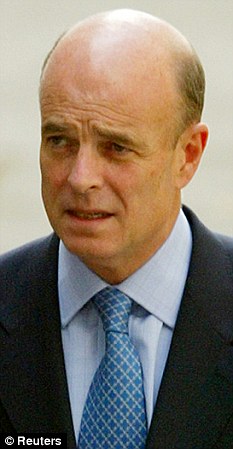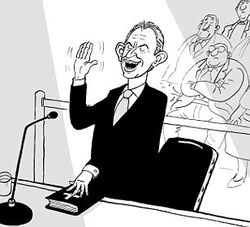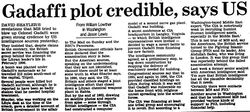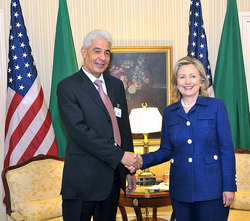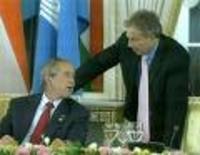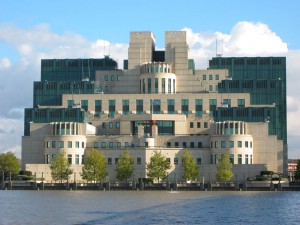By: Ray McGovern, former CIA analyst and Annie Machon, former MI5 intelligence officer
Recent remarks by the head of MI6, Sir John Sawers, leave us wondering if the Secret Intelligence Service is preparing to “fix” intelligence on Iran, as his immediate predecessor, Sir John Scarlett, did on Iraq.
 Scarlett’s pre-Iraq war role in creating “dodgy dossiers” hyping the threat of non-existent “weapons of mass destruction” is well known. As for Sawers, the red warning light for politicization blinked brightly on July 4, as he told British senior civil servants that Iran is “two years away” from becoming a “nuclear weapons state.” How did Sawers come up with “two years?”
Scarlett’s pre-Iraq war role in creating “dodgy dossiers” hyping the threat of non-existent “weapons of mass destruction” is well known. As for Sawers, the red warning light for politicization blinked brightly on July 4, as he told British senior civil servants that Iran is “two years away” from becoming a “nuclear weapons state.” How did Sawers come up with “two years?”
Since late 2007, the benchmark for weighing Iran’s nuclear program has been the unanimous assessment by all 16 U.S. intelligence agencies that Iran halted its nuclear weapons program in late 2003 and that, as of mid-2007, had not restarted it. Those judgments have been revalidated every year since — despite strong pressure to bow to more ominous — but evidence-light — assessments by Israel and its neo-conservative supporters.
Intelligence Can Make a Difference
The 2007 the US National Intelligence Estimate helped to thwart plans to attack Iran in 2008, the last year of the Bush/Cheney administration. This shines through in George Bush’s own memoir, Decision Points, in which he rues the NIE’s “eye-popping declaration: ‘We judge with high confidence that in fall 2003, Tehran halted its nuclear weapons program.’”
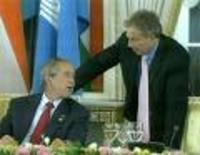 Bush continues, “But after the NIE, how could I possibly explain using the military to destroy the nuclear facilities of a country the intelligence community said had no active nuclear weapons program?” (Decision Points, p. 419)
Bush continues, “But after the NIE, how could I possibly explain using the military to destroy the nuclear facilities of a country the intelligence community said had no active nuclear weapons program?” (Decision Points, p. 419)
Hands tied on the military side, US covert operations flowered, with $400 million appropriated at that same time for a major escalation of the dark-side struggle against Iran, according to military, intelligence, and congressional sources cited by Seymour Hersh in 2008. This clandestine but all-too-real war on Iran has included attacks with computer viruses, the murders of Iranian scientists, and what the Israelis call the “unnatural” demise of senior officials like Revolutionary Guards Major General Hassan Moghaddam father of Iran’s missile program.
Moghaddam was killed in a large explosion last November, with Time magazine citing a “western intelligence source” as saying the Israel’s Mossad was behind the blast. More threatening still to Iran are the severe economic sanctions, which are tantamount to an act of war.
Israeli Prime Minister Benjamin Netanyahu and pro-Israel neo-conservatives in the U.S. and elsewhere have been pushing hard for an attack on Iran, seizing every pretext they can find. Netanyahu was suspiciously fast off the blocks, for example, in claiming that Iran was behind the tragic terrorist bombing of Israeli tourists in Bulgaria on July 18, despite Bulgarian authorities and even the White House warning that it is too early to attribute responsibility.
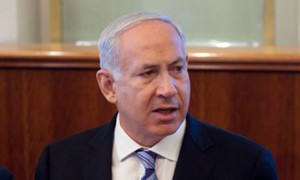 Netanyahu’s instant indictment of Iran strongly suggests he is looking for excuses to up the ante. With the Persian Gulf looking like an accident waiting to happen, stocked as it is with warships from the U.S., the U.K. and elsewhere — and with no fail-safe way of communicating with Iranian naval commanders — an escalation-generating accident or provocation is now more likely than ever.
Netanyahu’s instant indictment of Iran strongly suggests he is looking for excuses to up the ante. With the Persian Gulf looking like an accident waiting to happen, stocked as it is with warships from the U.S., the U.K. and elsewhere — and with no fail-safe way of communicating with Iranian naval commanders — an escalation-generating accident or provocation is now more likely than ever.
July 23: Marking a Day of Infamy
Oddly, Sawers’s speech of July 4 came just as an important date approached — the tenth anniversary of a sad day for British intelligence on Iraq. On July 23, 2002 at a meeting at 10 Downing Street, then-MI6 head, John Dearlove, briefed Tony Blair and other senior officials on his talks with his American counterpart, CIA Director George Tenet, in Washington three days before.
In the official minutes of that briefing (now known as the Downing Street Memo), which were leaked to the London Times and published on May 1, 2005, Dearlove explains that George Bush has decided to attack Iraq and the war was to be “justified by the conjunction of terrorism and weapons of mass destruction.” While then-Foreign Secretary Jack Straw points out that the case was “thin,” Dearlove explains matter-of-factly, “The intelligence and facts are being fixed around the policy.”
 There is no sign in the minutes that anyone hiccupped — much less demurred — at making a case for war and furthering Blair’s determination to join Bush in launching the kind of “war of aggression” outlawed by the post-world war Nuremberg Tribunal and the UN treaty.
There is no sign in the minutes that anyone hiccupped — much less demurred — at making a case for war and furthering Blair’s determination to join Bush in launching the kind of “war of aggression” outlawed by the post-world war Nuremberg Tribunal and the UN treaty.
Helped by the acquiescence of their chief spies, the Blair government mainlined into the body politic un-assessed, raw intelligence and forged documents, with disastrous consequences for the world.
UK citizens were spoon-fed fake intelligence in the September Dossier (2002) and then, just six weeks before the attack on Iraq, the “Dodgy Dossier”, based largely on a 12-year old PhD thesis culled from the Internet — all presented by spy and politician alike as ominous premonitory intelligence.
So was made the case for war. All lies, resulting in hundreds of thousands dead and maimed and millions of Iraqis displaced — yet no one held to account.
Sir Richard Dearlove, who might have prevented this had he had the integrity to speak out, was allowed to retire with full honours and became the Master of a Cambridge college. John Scarlett, who as chair of the Joint Intelligence Committee signed off the fraudulent dossiers, was rewarded with the top spy job at MI6 and a knighthood. George W. Bush gave George Tenet the Presidential Medal of Freedom — the highest civilian award.
What need have we for further proof? “So are they all, all honourable men” — reminiscent of those standing with Brutus in Shakespeare’s play, but with no Mark Anthony to expose them and stir the appropriate popular reaction.
Therein lies the problem: instead of being held accountable, these “honourable men” were, well, honoured. Their soft landings offer a noxious object lesson for ambitious bureaucrats who are ready to play fast and loose with the truth and trim their sails to the prevailing winds.
Ill-got honours offer neither deterrent nor disincentive to current and future intelligence chiefs tempted to follow suit and corrupt intelligence rather than challenge their political leaders with hard, un-“fixed” facts. Integrity? In this milieu integrity brings knowing smirks rather than honours. And it can get you kicked out of the club.
Fixing Intelligence on Iran
Are we in for another round of “fixing” — this time on Iran? We may know soon. Israeli Prime Minister Netanyahu, citing the terrorist attack in Bulgaria, has already provided what amounts to a variation on Dearlove’s ten-year old theme regarding how war can be “justified by the conjunction of terrorism and weapons of mass destruction.”
According to the Jerusalem Post on July 17, Netanyahu said that all countries that understand that Iran is an exporter of world terror must join Israel in “stating that fact clearly,” in order to emphasize the importance of preventing Iran from obtaining a nuclear weapon.
Appearing yesterday on Fox News Sunday and CBS’s Face the Nation, Netanyahu returned to that theme. Putting the blame for the terrorist attack in Bulgaria squarely on Iran (and Hezbollah), Netanyahu warned of the increased dangers that would accrue if Iran acquired nuclear weapons. “What would be the consequences if the most dangerous régime in the world got the world’s most dangerous weapons?”.
Will MI6 chief Sawers model his conduct on that of his predecessors who “justified” war on Iraq? Will he “fix” intelligence around U.K./U.S./Israeli policy on Iran? Parliamentary overseers should demand a briefing from Sawers forthwith, before erstwhile bulldog Britain is again dragged like a poodle into another unnecessary war.
Annie Machon is a former intelligence officer in the UK’s MI5 Security Service and Ray McGovern is a fomer U.S Army Intelligence Officer and CIA analyst.





